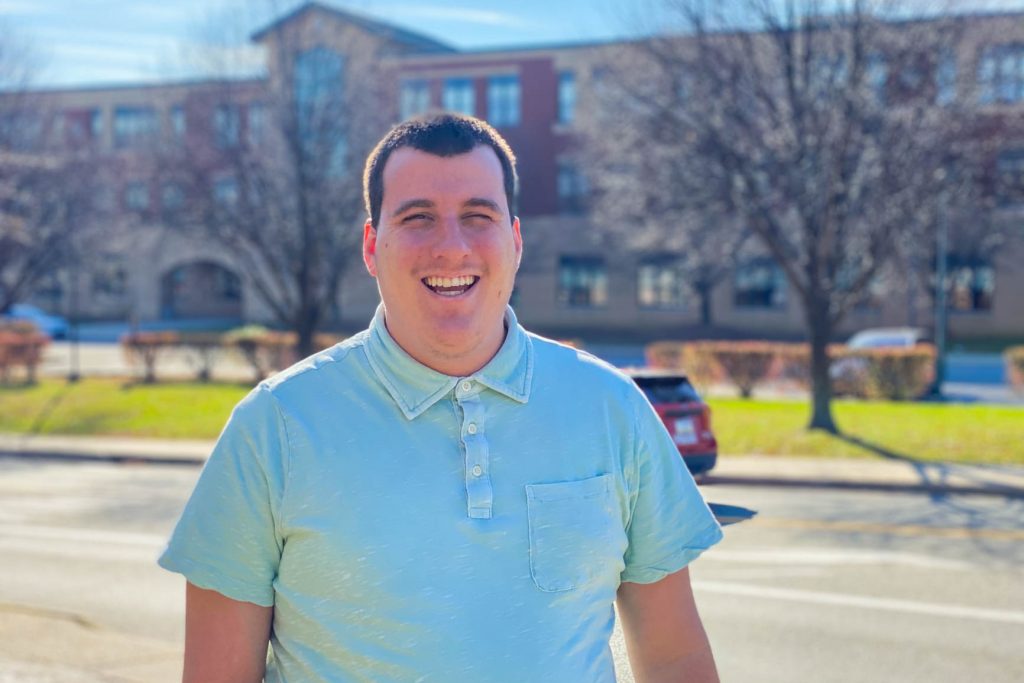
LESS COMMUTING, MORE MUSIC-MAKING
Joseph Callahan, a senior music education major, found more time to spend teaching and writing music this semester by being at home.

oseph Callahan considered taking a leave of absence this semester.
But with the format of his classes having changed, he remained in classes and ended up having his best semester yet.
The COVID-19 pandemic changed how Callahan’s work, classes and activities operated, requiring him to spend much more time on his computer, but also giving him free time to write and play music. Despite having to record himself singing alone in his home office instead of performing live with others, he felt like the work was rewarding.
Callahan already faced an eventful year after taking a medical leave in the Spring 2020 semester and then later returning to classes, which had been moved online once the pandemic began. Coming into the Fall 2020 semester, he then worried about becoming stressed completing his course load and the safety of going to Main Campus for class.
“It can be nerve-racking to start a new semester in general,” Callahan said. “But starting one with a pandemic happening is extra scary.”
In past semesters, Callahan would wake up in Ridley, Pennsylvania, head to Morton Station, get on the train and do homework during his 40-to-50-minute ride before reaching Temple University. During the first week of fall classes in August, Callahan commuted to Main Campus for three of those days as five of his eight classes had in-person components.
Some of his classes were still virtual, though. While Temple had spaces available for students to attend virtual classes like Charles Library, Callahan scrambled to find places where he could sing on camera for his choral ensemble course without disturbing others.
In early September, as COVID-19 cases among students on campus rose, Callahan considered taking a leave of absence if the in-person classes he had signed up for did not move online.
“I just kind of had to make the decision of, ‘Well, if I do this semester, whether it ends up being in person the whole time or online, then I get a step further to my degree, which is a good thing. If I withdraw from the semester or if I drop the semester, and then things go online, I’m going to feel like an idiot because I just dropped out of college and they ended up going online, which is exactly what I wanted,” Callahan said.
When the university moved 95 percent of its instruction online on Sept. 3, including all of Callahan’s classes, due to an outbreak of COVID-19 among students, he felt “so much better,” as the switch made attending classes easier for him.
“Going back and forth within a day was very difficult for me as a commuter because I didn’t have like a dorm or off-campus housing in walking distance to do my Zoom classes and then go to my in-person classes on campus,” Callahan said on Sept. 3.
Now, he could spend most of his time working out of a small office space at home with his girlfriend, her parents, her grandparents and their three dachshund dogs. Time he normally would have spent sitting on the train to get to class he could now spend writing marching band music, classical and jazz music on his piano.
In his free time, Callahan instructed a high school marching band and touched up his piano playing in private virtual lessons.
One of Callahan’s eight classes was an externship, and so it required students to teach virtual music lessons to peers in the class for practice and then grade school students in Philadelphia.
Between October and November, Callahan conducted virtual 10-minute lessons teaching students to sing songs like “Hot Cross Buns,” and a song from “Mr. Roger’s Neighborhood” in kindergarten music classrooms. He also taught an after-school choir about melody and rhythm.
“These students are in the same situation that we are, they’re online and honestly a lot of them don’t have the same resources that college students have when it comes to education online, so it’s really awesome just to interact with them and see the smiles on their faces,” Callahan said.
Working with younger students who didn’t know how to turn their microphones off or on, Callahan became used to loud noises interrupting lessons or silence from lack of participation.
“The way I kind of think about it, it’s less of the standard classroom, it’s more kind of like Blue’s Clues in a way, where you’re kind of waiting for a response so you say something like, ‘So what do we think, what kind of note was that?’ And you stop for five seconds and you’re like, ‘Good! A quarter note! Exactly,’” Callahan said on Sept. 22.
This format compared to his assignments for his music courses, where instead of performing in person, he was recording performances and turning in files. For a performance in University Singers, a Temple choir Callahan was in, students sent in individual vocal parts and the recordings were edited together and then streamed, he said.
“Virtually, it was a very different experience ’cause you can’t hear the other students so you’re just kind of singing solo the whole time,” Callahan said on Oct. 13. “It’s no longer like, really communal. It’s more like, you know, just like by yourself.”
As midterms passed and November came, Callahan thought the presidential election was an “elephant in the room” in many of his classes, even though he felt it impacted students’ lives. He felt that who would become the president would determine how much of a chance students had to return to in-person classes.
On Nov. 7, the morning before media outlets reported that former Vice President Joe Biden and was elected next president, Callahan was trying to go about a usual Saturday, except his anxiety about the impending election results stirred in his mind.
“One side is that you know, I didn’t want like Trump to win, and the other side of it is I didn’t want people who supported Trump to get mad about him not winning,” Callahan said on Nov. 17. “So in that way it was a little scary, I guess.”
When the election results were announced, he was happy with the outcome and moved on with his completing coursework and teaching. Before Fall Break, he was surprised about how moderate his semester felt after getting through the first few weeks.
“I wouldn’t say it was easy, but it was nothing that was insane,” Callahan said on Nov. 19.
Looking ahead, next semester will be his last of completing coursework before part-time student teaching in Fall 2021. So, he felt extra time he spent teaching in his own virtual classroom this semester proved beneficial for him.
“I’m feeling pretty happy with my progress this semester in terms of both my grades and also just progressing as a teacher and gaining more experience in externships,” Callahan said. “Teaching actual students helped.”
Overall, feeling proud of his progress grade-wise, teaching-wise and music-wise, Callahan said it just “feels pretty good to be almost done,” whatever the format of his schooling is.
“I’m kind of one of those people that just wants to get this degree at this point,” Callahan said on Dec. 7, the last day of classes. It’s more of whatever cost it takes, I’m just gonna do it. Whether it’s online or whether it’s in person, I’m just gonna do it.”

